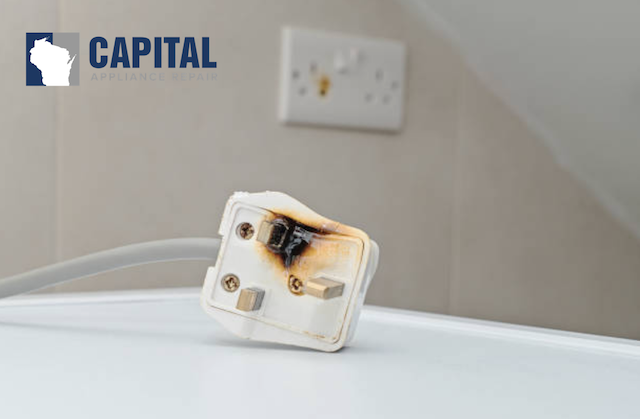Appliance Safety Tips

The appliances in a house often make life much less stressful, but when you operate appliances incorrectly, they might pose significant health risks. It is important to maintain appliances and ensure that they will not turn into hazards by adhering to these helpful home appliance safety tips from Capital Appliance Repair.
The professional tips below will help to prevent fires and injuries related to household appliances. Even still, hazards might still occur. In the event an appliance has issues or starts to malfunction and becomes a danger, call a Madison appliance repair service to fix the appliance issue. Certified repairmen will know how to safely fix the problem without further damage or injury to a household appliance.
Install GFCI Outlets in Wet Locations
Laundry rooms, kitchens, entry ways, bathrooms, basements, outdoor areas and garages are susceptible to possible dampness or water. Of course, electricity and moisture do not mix, so power cords should always be plugged into ground-fault circuit interrupters (GFCIs).
This special type of outlet can prevent electrocution by tripping the circuit if any interruptions in power occur.
If you do not currently have GFCI outlets in wet rooms around your home, it is time to install them or call an electrician in Madison. Once that is done, for additional safety measures, follow the warnings of certain appliance manuals that indicate a home appliance is not designed for outdoor use.
Cords, Outlets & Electronics Away From Damp Areas
A lot of appliances are specifically manufactured for outdoor use, like gas and charcoal grills, for example. If you make us of electrical appliances outside – including refrigerators, dishwashers, freezers and ice makers, power tools and others – monitor that all plugs and outlets are not wet. Using weatherproof electronics will help with this, along with GFCI outlets with water-tight gaskets.
Extension Cords are Only a Temporary Solution
An extension cord poses many noticeable risks, including:
- The likelihood of loose connections that might create sparks and start a fire.
- The possibility of power fluctuations that would damage the appliance.
- Greater vulnerability to water penetration that might cause electrocution.
- The potential for cords overheating and becoming a fire hazard when an low-quality extension cord is combined with a high-power appliance.
When choosing an extension cord for temporary use, be sure it’s the right gauge for the electrical equipment in question. The smaller the gauge, the larger the cord size. For instance, a simple household extension cord for a lamp could have a 16-gauge cord while a larger cord for a refrigerator or an air conditioner needs a 12-gauge wire.
Length is also crucial. The longer the extension cord, the more power is lost en route, a phenomenon referred to as voltage drop. Shorter extension cords are good for power tools and outdoor equipment.
Read the Manual for Any Type of Appliance You Purchase
It is easy to guess that you know how to operate your new appliance without consulting the operating manual, but reading the manufacturer guidelines is necessary for a lot of reasons and will prevent the need to find appliance repair near me in the event an appliance breaks from incorrect use:
- You should find out whether your house’s electrical wiring is good enough to support the new appliance. You might have to install a better circuit to prevent overloading your current ones.
- You learn more about advanced features you might not otherwise known about.
- You learn whether the appliance is safe for outdoor areas or not.
- You do not have the frustration that can come from attempting to operate a new appliance with no instructions!
Unplug Small Appliances in Your Home When Not in Use
You can stop unnecessary energy use by unplugging small appliances when not in use. The reason is small appliances sometimes include LED indicators, clocks and other energy-consuming features standby mode.
Unplug televisions, computer monitors, internet routers, game consoles, cellphone chargers and more to reduce wasteful energy use. Just remember, it’s worthwhile to keep DVRs and similar electronics plugged in to not miss their automatic background functions.
For more tips on using home appliances safely, or to schedule a professional appliance repair company, please contact Capital Appliance Repair in Wisconsin. Our technicians can repair all popular household appliances!
OTHER RESOURCES:
Appliance Repair Cost
DIY Appliance Repair Tips
Repair or Replace Appliances
Refrigerator Parts
Home Services Campaign Disclaimer: This site is a free service to assist homeowners in connecting with local service providers. All contractors/providers are independent and this site does not warrant or guarantee any work performed. It is the responsibility of the homeowner to verify that the hired contractor furnishes the necessary license and insurance required for the work being performed. All persons depicted in a photo or video are actors or models and not contractors listed on this site.
Copyright ©2026 Capital Appliance Repair
